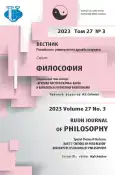Existential Sources of School Shootings and Columbine
- Авторлар: Baeva L.V.1
-
Мекемелер:
- Astrakhan Tatishchev State University
- Шығарылым: Том 27, № 3 (2023): KANT’S “CRITIQUE OF PURE REASON” AND WAYS OF ITS READING BY PHILOSOPHERS
- Беттер: 774-792
- Бөлім: PERSON AND SOCIETY
- URL: https://journal-vniispk.ru/2313-2302/article/view/325250
- DOI: https://doi.org/10.22363/2313-2302-2023-27-3-774-792
- EDN: https://elibrary.ru/EQVFPO
- ID: 325250
Дәйексөз келтіру
Толық мәтін
Аннотация
Manifestations of school shooting or ‘columbine’, constituted by armed mass attacks and murders in educational institutions perpetrated by adolescents, have proliferated in recent years. They are marked by their unpredictability, spontaneity and cruelty. This phenomenon has been subject to scholarly examination from various perspectives, enabling the elucidation of its multifarious traits and characteristics as a means of diagnosis and prevention. This study surveys established academic approaches to the study of school shootings (psychological, legal, sociological, semiotic, existential) and delineates their specificity and scope. Drawing on analysis of incidents of school shootings in Russia from 2014-2022, key signs and tendencies in the occurrence of mass attacks on educational institutions are delineated. Adopting existential approaches in philosophy and psychology, notably the works of A. Camus, E. Fromm, M. Boss, V. Frankl and L. Berkowitz, the semantic stages and constituents of school shootings as existential crimes and subsequent suicides are elucidated. The present study aims to identify and characterise the roots and essence of school shootings ('columbine') as an existential crime type, in order to comprehend the semantic motivational origins of school shootings and analyse the ‘boundary situation’ engendering individual destructive rebellion against the world. The nexus between unresolved existential needs and quandaries of the individual and the factors triggering self-destructive personality mechanisms is expounded, whereby the individual enacts an ‘escape’ from reality against the backdrop of media-disseminated aggressiveness and legitimation of violence as a means of overcoming problems and self-presentation. The existential analysis and modelling of school shooters’ actions offered here has enabled conclusions to be drawn regarding potential countermeasures to such crimes.
Авторлар туралы
Liudmila Baeva
Astrakhan Tatishchev State University
Хат алмасуға жауапты Автор.
Email: baevaludmila@mail.ru
ORCID iD: 0000-0003-0439-525X
PhD in Philosophy, Professor, Director of the Caspian Humanitarian Institute, Pofessor of Department of Philosophy
20a Tatischeva St., 414056, Astrakhan, Russian FederationӘдебиет тізімі
- Langman P. Why children kill. What is going on in the head of a school shooter. Moscow: Eksmo publ.; 2022. (In Russian).
- Langman P. School shooters: The warning signs. (n.d.). [Internet]. Available from: https://schoolshooters.info/sites/default/files/school_shooters_warning_signs_1.1.pdf (accessed: 24.02.2023).
- Pogrebnaya SK. Socio-psychological expertise in extremist offenses committed by minors In: Science and society: Thesis s of the All-Russian Scientific and Practical Conference. Vol. XIV. 2020. P. 40—44. (In Russian).
- Pastyka EA, Pitanova ME. The problem of armed attacks by teenagers in educational institutions. Bulletin of Penza State University. 2020;3(31):21—25. (In Russian).
- Karpov OV. The Columbine cult the main determinants of mass killings in schools. Bulletin of the Kazan Law Institute of the Ministry of Internal Affairs of Russia. 2018;4(34):442—446. https://doi.org/10.24420/KUI.2018.49.27.001. (In Russian).
- Sukhodolskaya YuV. Mass murder in educational organizations as an object of criminological research. Bulletin of Science and Education. 2019;6:51—53. (In Russian).
- Chunin AS. The phenomenon of school shooting in modern Russia. The legal aspect. Review. NCPTI. 2020;3(22):48—52. (In Russian).
- Vanyan K. Modern mass media as a new embodiment of the problem of crime on the basis of manic obsession. Issues of Russian justice. 2020;(10):309—324. (In Russian).
- Mosechkin IN. Victimological aspects of countering armed attacks on educational institutions (school shooting).Victimology. 2019;1(19):46—53. (In Russian).
- Orlova YuR. Actual issues of organization by internal affairs bodies of prevention of violent crimes committed by minors in educational institutions. Criminological journal. 2020;(1):43—46. (In Russian). http://doi.org/10.24411/2687-0185-2020-10012
- Karpova AYu. Mechanisms of individual radicalization in the process of youth self-organization. Youth and youth policy: new meanings and practices. Ryazantsev SV, Rostovskaya TK, editors. Moscow: Ekon-inform publ.; 2019. P. 69—81. (In Russian).
- Karpova AYu, Maksimova NG. Schoolshooting in Russia: what matters? Power. 2021;(29):93—108. (In Russian).
- Selivanova EA. Preparation of teachers for the prevention of aggressive behavior of students in schools. Scientific support of the system of advanced training of personnel. 2018;4(37):78—87. (In Russian).
- Saprykin VA. Destructive behavior of youth in the conditions of information war: columbine-challenges and measures to overcome. Theory and practice of social development. 2019;1(131):18—21. (In Russian).
- Malova EO. Modern realities of asocial manifestations of adolescents in the Internet space. Innovative development of vocational education. 2020;2(26):107—114. (In Russian).
- Krasnova GV, Markov AA. The Internet as an actual threat to personal information security. Proceedings of the St. Petersburg State University of Economics. 2018;2(110):102—108. (In Russian).
- Grinenko UB, Romero Reyes IV. Semantic analysis of digital destructive content on the topic of “schoolshooting” in the VKontakte social network. Psychology and Law. 2021;11(40): 180—195. (In Russian). http://doi.org/10.17759/psylaw.2021110413
- Knots ND, Semenova MN. Schoolshooting: murder and post-homicidal suicide as a transgressive act. Suicidology. 2021;12(4):16—30. (In Russian). http://doi.org/ 10.32878/suiciderus.21-12-04(45)-16-30
- Anderson CA., Shibuya A, Ihori N, Swing EL, Bushman BJ, Sakamoto A, Barlett CP. Violent video game effects on aggression, empathy, and prosocial behavior in Eastern and Western countries: A meta-analytic review. Psychological Bulletin. 2010;136(2):151—173. https://doi.org/10.1177/1948550610379
- Ferguson CJ, Garza A, Jerabeck J, Ramos R, Galindo M. Not worth the fuss after all? Cross-sectional and prospective data on violent video game influences on aggression, visuospatial cognition and mathematics ability in a sample of youth. Journal of Youth and Adolescence. 2013;(42):109—122.
- Camus A. The Myth of Sisyphus. An essay on the absurd. In: The Rebellious man. Philosophy. Politics. Art. Moscow: Politizdat publ.; 1990. (In Russian).
- Fromm E. Anatomy of human destructiveness. Moscow: AST Publishers; 2015. (In Russian).
- Knots ND, Okonskaya NK, Intraskikh AYu. Schoolshooting: socio-philosophical aspect of the problem. Bulletin of Perm University. Philosophy. Psychology. Sociology. 2022;(2):26—276. (In Russian). https://doi.org/10.17072/2078-7898/2022-2-264-276
- Boss M. Psychoanalysis and Daseinsanalysis. Lefebre LE, transl. New York: Basic Books; 1963.
- Frankl V. Man in search of meaning. Moscow: Progress publ.; 1990. P. 45—128. (In Russian).
- Berkowitz L. Aggression: causes, consequences and control. Saint Petersburg: Prime-Euroznak publ.; 2007. (In Russian).
Қосымша файлдар









